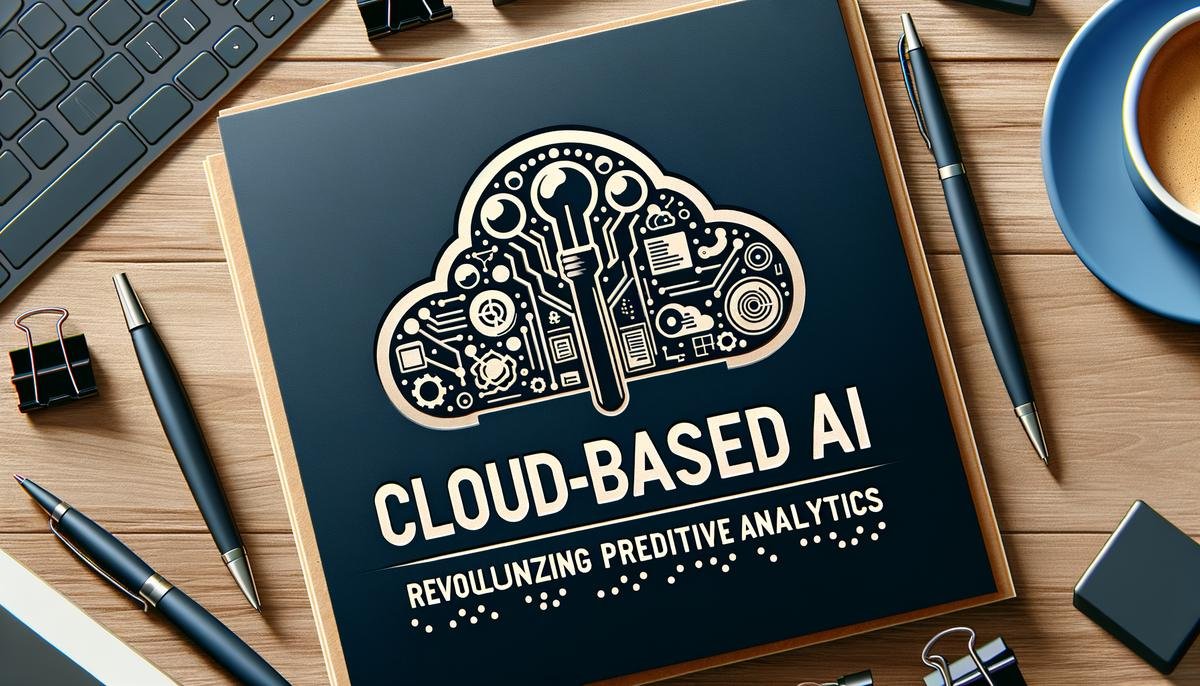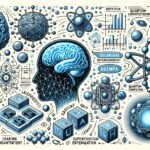Predictive analytics and artificial intelligence (AI) are at the forefront of technological innovation, reshaping how we forecast and plan for the future. The integration of AI into predictive analytics promises enhanced accuracy and speed, making it a crucial tool across various industries. This article explores the transformative power of AI within this domain, highlighting its impact, challenges, and the ethical considerations it brings to the fore.
The Role of AI in Predictive Analytics
How AI is Shaping the Future of Predictive Analytics
Predictive analytics has always been about understanding the future. It uses historical data to forecast what might happen next. But now, artificial intelligence (AI) is transforming this landscape, making predictions not just faster but more accurate than ever before.
Traditionally, predictive analytics relied heavily on statistical models and human expertise. Analysts would study trends, identify patterns, and make educated guesses about future outcomes. This process was not only time-consuming but often limited by the analysts’ ability to interpret complex data.
Enter AI, a game-changer in more ways than one. AI technologies, especially machine learning, have the ability to sift through massive datasets at speeds no human can match. They learn from the data, identifying patterns and anomalies that might escape a human analyst. With each new piece of data, these AI systems become smarter and their predictions more accurate.
One of the key areas AI is revolutionizing is customer behavior prediction. Businesses can use AI to analyze customer data, spotting trends in purchasing habits. This helps them predict future buying behaviors, enabling personalized marketing strategies that can significantly boost sales.
In the healthcare sector, AI-driven predictive analytics is making waves by forecasting disease outbreaks. By analyzing data from various sources, including social media and satellite images, AI can predict where and when an infectious disease might spread. This allows for faster response times, potentially saving lives.
Financial markets are another area benefiting from AI. Predictive analytics can forecast market trends, helping investors make informed decisions. AI systems analyze vast amounts of financial data, spotting patterns that could indicate an upcoming market shift.
The accuracy of AI in predictive analytics is not just about raw data processing power. AI algorithms are capable of continuous learning. They adapt to new information, refining their predictions over time. This aspect of AI, known as machine learning, is crucial for its success in predictive analytics.
But AI’s impact on predictive analytics isn’t without challenges. There are concerns about privacy, as AI often requires access to sensitive data. There’s also the issue of transparency. AI predictions can be incredibly complex, and understanding how AI arrived at a particular forecast can be difficult.
Despite these challenges, the potential benefits of AI in predictive analytics are immense. From making more informed business decisions to predicting health epidemics, AI is making the future of predictive analytics brighter, more accurate, and infinitely more efficient.

Understanding Google Cloud’s AI and Machine Learning Tools
Now, let’s shine a spotlight on what specifically makes Google Cloud’s AI and machine learning tools a step ahead in the realm of predictive analytics and beyond. Google Cloud is well-known for harnessing the power of AI and machine learning to transform how businesses forecast trends, understand customer behavior, and make critical decisions. So, what sets it apart?
First off, Google Cloud AI and machine learning tools are renowned for their accessibility. These tools are designed to be user-friendly, allowing not just data scientists but also developers and business professionals to leverage AI capabilities. This democratization of AI technology means that more people can use these powerful tools to drive innovation and efficiency in their operations.
Another standout feature of Google Cloud’s offerings is its advanced machine learning models. Google has been at the forefront of machine learning research, and it brings this expertise to its cloud services. These advanced models can dig deeper into data, uncovering insights that would be impossible for traditional analytical methods to find. This not only enhances the accuracy of predictions but also opens up new possibilities for understanding complex patterns and relationships in data.
Integration capabilities also set Google Cloud apart. In today’s digital ecosystem, the ability to seamlessly integrate with existing systems and software is crucial. Google Cloud’s AI and machine learning tools are designed for easy integration with other Google services and third-party applications. This ensures that businesses can easily incorporate AI into their existing workflows without the need for extensive overhauls, making the transition smoother and more cost-effective.
Scalability is another key advantage. Google Cloud’s AI and machine learning tools are built to scale. Whether a business is looking to process hundreds or millions of data points, Google Cloud can effortlessly adjust to handle the workload. This scalability is crucial for businesses looking to grow, as it ensures that their AI capabilities can expand in tandem with their operations.
Finally, Google Cloud places a strong emphasis on ethical AI use. In an era where privacy concerns and ethical considerations are increasingly coming to the foreground, Google Cloud’s commitment to responsible AI practices is reassuring for businesses. This includes transparent AI processes, robust privacy controls, and tools designed to mitigate bias in machine learning models, ensuring that businesses can leverage AI not just powerfully, but also ethically.
In sum, Google Cloud’s AI and machine learning tools stand out for their accessibility, advanced models, seamless integration, scalability, and ethical approach to AI. These characteristics not only make Google Cloud a powerful ally for businesses looking to harness AI but also a responsible one, prioritizing privacy, transparency, and the ethical use of technology. As companies continue to explore the capabilities of AI and machine learning, Google Cloud’s tools represent a combination of advanced technology and responsible innovation, setting a standard for what AI can achieve in the business world and beyond.

Real-world Applications and Case Studies
Google Cloud AI is revolutionizing the way businesses approach predictive analytics, offering a suite of advanced tools that leverage machine learning and artificial intelligence to drive strategic decisions. As companies across various sectors embrace technology to stay ahead, Google Cloud AI stands at the forefront by providing an ecosystem that not only enhances predictive analytics capabilities but also ensures these advancements are accessible and ethical.
One of the critical implementations of Google Cloud AI in businesses is its ability to enhance decision-making processes. With its advanced analytics and machine learning models, Google Cloud AI can process vast sets of data to predict consumer trends, operational inefficiencies, and future market movements with unprecedented precision. This capability allows businesses to make more informed decisions, optimizing their strategies for better outcomes.
Furthermore, customer engagement strategies are seeing a significant transformation thanks to Google Cloud AI’s predictive analytics. By analyzing customer data and behavior patterns, businesses can predict future purchasing behaviors and tailor their marketing efforts accordingly. This personalized approach not only improves customer satisfaction but also increases the effectiveness of marketing campaigns, leading to higher conversion rates and loyalty.
In the realm of operations and supply chain management, predictive analytics powered by Google Cloud AI is playing a pivotal role in forecasting demand and optimizing inventory levels. Businesses can anticipate demand fluctuations more accurately, ensuring they have the right amount of stock at the right time. This efficiency reduces waste, lowers costs, and enhances the overall customer experience by ensuring products are always available when needed.
Moreover, Google Cloud AI’s predictive analytics is crucial for risk management. By identifying potential risks and vulnerabilities within business operations or in the broader market environment, companies can develop strategies to mitigate these risks before they become significant issues. This proactive approach to risk management not only safeguards the company’s assets but also ensures stability and reliability in the eyes of stakeholders.
Ethics and transparency in AI applications have been a concern, but Google Cloud is addressing these issues head-on. Their commitment to ethical AI practices is evident in their transparent use of data, stringent privacy controls, and efforts to mitigate bias in AI models. This ethical framework not only builds trust among users and customers but also sets a standard for responsible AI development and usage in the industry.
In conclusion, the implementation of Google Cloud AI for predictive analytics is proving to be a game-changer for businesses focused on innovation and efficiency. By leveraging the power of AI and machine learning, companies can predict future trends, enhance decision-making, personalize customer interactions, optimize operations, and manage risks effectively. As Google Cloud AI continues to evolve, its impact on predictive analytics and business strategies is expected to grow even more, paving the way for smarter, more data-driven decision-making across industries.

The Future of Predictive Analytics with Google Cloud AI
Exploring the future of predictive analytics with advancements in Google Cloud AI unveils an intriguing forecast, teeming with opportunities and innovations across diverse sectors. With the solid foundation laid by the introduction of AI into predictive analytics, and considering the challenges and advantages highlighted earlier, we delve into what lies ahead, specifically focusing on the impact of Google Cloud AI enhancements.
The evolution of predictive analytics is set to revolutionize the dynamic between businesses and predictive insights. At the forefront of this transformation is the continuous improvement of Google Cloud AI, which promises not just to refine the accuracy of predictions but also to democratize access to cutting-edge technology. Small businesses and large enterprises alike stand to benefit, as Google Cloud AI’s advancements lower the technical barriers, making advanced analytics more accessible to companies irrespective of their size or sector.
Customer experience is poised for a dramatic shift, driven by deeper and more accurate insights into consumer behavior. As Google Cloud AI becomes more adept at analyzing complex patterns and predicting trends, businesses can anticipate customer needs with unprecedented precision. This capability means companies can tailor their services and products to meet customer expectations, fostering loyalty and enhancing satisfaction.
In the realm of supply chain and operations management, the advancements in Google Cloud AI herald a new era of efficiency and responsiveness. By accurately predicting demand, inventory levels, and potential supply chain disruptions, companies can optimize their operations, reduce costs, and improve service delivery. This level of operational intelligence was once the purview of only the largest corporations, but with the scalability of Google Cloud AI, it’s now within reach for businesses of all sizes.
Risk management, an essential aspect of business and finance, is set to benefit significantly from the enhanced predictive analytics capabilities of Google Cloud AI. By analyzing vast datasets and recognizing patterns that may indicate potential risks, companies can proactively implement measures to mitigate these risks before they materialize. This proactive approach to risk management not only protects businesses from potential losses but also contributes to a more stable and predictable operating environment.
Finally, the commitment to ethics and transparency in AI applications remains a cornerstone of advancements in Google Cloud AI. As predictive analytics becomes increasingly integral to business operations and decision-making, ensuring the ethical use of AI is paramount. Google Cloud AI’s emphasis on transparency, privacy controls, and bias mitigation is crucial in building trust and ensuring the responsible use of technology. By prioritizing these ethical considerations, Google Cloud AI sets a standard for the future, where advancements in AI enhance not just the capabilities of businesses but also uphold the values of society at large.
As we look ahead, the future of predictive analytics with advancements in Google Cloud AI is bright, brimming with potential to transform industries and redefine how businesses operate. The intersection of AI and predictive analytics marks the beginning of a new chapter, one where the possibilities are as vast as the data that fuels them.

Ethical Considerations and Challenges
Navigating the ethical maze of AI in predictive analytics is a complex ordeal, akin to walking a tightrope with no safety net. The leaps AI has made are not without their moral quandaries, making the trek towards a technologically advanced future filled with both excitement and caution. As AI continues to refine how we anticipate and shape future trends, it uncovers a Pandora’s box of ethical considerations that demand our attention and foresight.
At the heart of these considerations lies the stark reality of data privacy. AI’s predictive prowess is powered by vast datasets, often personal in nature. This raises the alarm on how such data is collected, used, and shared. The risk of personal information being mishandled or exploited under the guise of predictive analytics brings to light the dire need for stringent data protection guidelines that safeguard individual privacy without stifling innovation.
Another formidable challenge is the specter of bias that haunts AI algorithms. These digital brains learn from historical data, and if this data carries prejudices, the AI’s predictions can inadvertently perpetuate and even amplify these biases. This poses a significant ethical dilemma, particularly in sectors like hiring, law enforcement, and lending, where biased predictions can have life-altering impacts on individuals. Ensuring AI predictive models are developed with an eye towards fairness and diversity is imperative to prevent the automation of inequality.
The opacity of AI operations adds another layer of complexity. The “black box” nature of many AI systems makes it difficult to understand how they arrive at certain predictions. This lack of transparency can erode trust and accountability, leaving users to wonder about the rationale behind AI-driven decisions. Demystifying AI processes and outcomes is essential to foster a culture of trust and ensure responsible use, especially in high-stakes domains like healthcare and criminal justice.
Moreover, the autonomy of AI in decision-making processes introduces the risk of diminishing human oversight. While the efficiency of AI in making predictions can be unparalleled, the absence of human judgment can lead to outcomes that, while logically sound, may lack empathy, ethics, or social appropriateness. Balancing the scales between AI’s analytical capabilities and human values is crucial to ensure that predictive analytics serve the greater good.
The road to ethically harnessing AI for predictive analytics is fraught with challenges, yet it’s a path we must navigate with care and diligence. Establishing robust ethical guidelines, fostering transparency, and promoting inclusivity in AI development are steps forward in ensuring that this powerful tool enhances our futures without compromising our values or rights. As we advance, it is paramount that we keep the dialogue on ethics at the forefront of AI innovation, steering this ship with a moral compass as precise as the predictions we aim to achieve.

The exploration of AI in predictive analytics offers a compelling glimpse into the potential for technology to reshape our approach to prediction and decision-making. As we continue to harness these advancements, the balance between innovation and ethical consideration becomes ever more critical. The journey toward fully realizing the benefits of AI in predictive analytics demands a commitment to responsible use, ensuring that as we move forward, we do so with a keen awareness of the importance of privacy, transparency, and fairness. The future beckons with promises of efficiency and insight, guided by the responsible and ethical application of AI technology.




